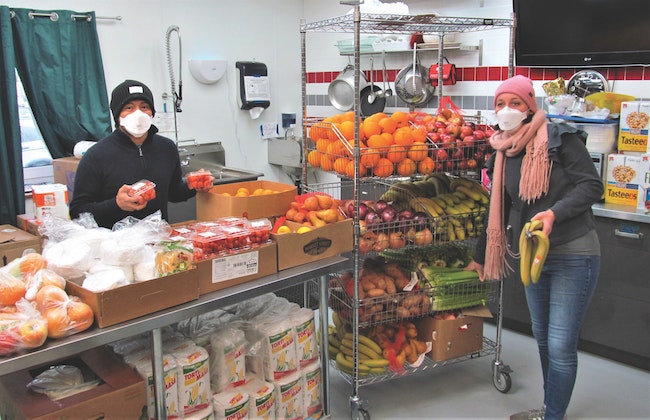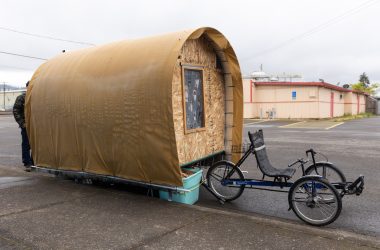 Volunteers at The Rural Organizing Project ready for the rush on Tuesday, Feb 1 at its pantry at 632 E. Main St. in Cottage Grove. ROP started its food pantry in 2019, and since then, the demand has only increased, according to Emily Roth, pantry manager. The food pantry is operative Tuesdays from 11 a.m. to 1 p.m. and Thursday from 4 to 6 p.m. DANA MERRYDAY/ THE CHRONICLE
Volunteers at The Rural Organizing Project ready for the rush on Tuesday, Feb 1 at its pantry at 632 E. Main St. in Cottage Grove. ROP started its food pantry in 2019, and since then, the demand has only increased, according to Emily Roth, pantry manager. The food pantry is operative Tuesdays from 11 a.m. to 1 p.m. and Thursday from 4 to 6 p.m. DANA MERRYDAY/ THE CHRONICLE
Hunger pangs in the county are increasing as food prices skyrocket, further straining residents already financially burdened by the pandemic.
“The need is greater than ever to get food into the homes of people who need it,” said Emily Ruth, who is the pantry manager for the Rural Organizing Project in Cottage Grove. “So many people have lost work, lost wages, suffered illness and loss with the pandemic … It’s created a double-bind where people have less money than they’ve had with raising food prices.”
The Bureau of Labor Statistics (BLS) reported on Jan. 12 the price of at-home food increased 6.5% in 2021. This is a steep jump, especially considering the average annual increase was only 1.5% in the past 10 years.
The price increase for food puts another stress on residents already financially strained from the economic strife from the pandemic — employment in Lane County is still 3 percentage points lower than pre-pandemic levels, according to the Oregon Employment Department. Additionally, several federal welfare programs pandemic expansions, like boosted unemployment assistance, expired in late 2021.
With all these factors coming to a head in 2022, “We’re expecting to have a bigger impact,” said Tom Mulhern, executive director of FOOD For Lane County (FFLC).
In 2020, FFLC distributed nine million pounds of food in the county. That’s an all-time record, Mulhern said. That number actually decreased in 2021 to around 8.5 million pounds, for which Mulhern credits the boost of pandemic emergency assistance in 2021, such as stimulus checks and additional SNAP funding.
But with those programs coming to an end, and as inflation continues to drive up the cost of food, Mulhern said FFLC is, “Apprehensive and getting prepared for an increase in demand.”
The food bank was started in 1984 by local food pantries to create a central “wholesale” organization to collect and distribute around $12 million worth of food to over 160 food pantries in Lane County annually, according to Mulhern.
Increased food prices have not affected food acquisition for FFLC because the vast majority of food acquired is through donations. FFLC is tied to the Oregon Food Bank, which provides around 17% of donated food. The Oregon Food Bank also acts as a conduit for the U.S. Department of Agriculture (USDA), which accounts for 48% of acquired food.
“That food comes in on big pallets in truckloads of food that we offloaded at our warehouse,” said Mulhern. “We also collect food from local grocery stores in much smaller quantities.”
Food pantries, such as Creswell Food Pantry and Cottage Grove’s Rural Organizing Project (ROP) South Lane Distribution, then put in an order to FFLC and either have it delivered or pick it up.
ROP was formed in 1992 to support human dignity groups. With the 2019 wildfires, followed by the pandemic, demand “just increased and increased,” said pantry manager Emily Ruth. The food pantry portion was created in 2019 to provide free food and hygiene products, first operating solely on community contributions before partnering with FFLC.
Ruth said that ROP strives to keep culturally relevant food in the pantry, specifically for the Spanish and Mam-speaking (a Mayan language) populations in Cottage Grove. “We hope to connect people with food that they actually are familiar with, accustomed to eating and know how to prepare,” she said.
Other independent food pantries are also filling the need. Burrito Brigade — a Eugene-based non-profit formed in 2014 that delivers free vegan burritos and services over 40 “Little Free Pantries” across Eugene, Springfield and Portland — started hosting a free grocery store where people can fill a food box.
“Imperfect local food is diverted from the landfill, and it’s set up like a grocery store,” said Jennifer Denson, executive director of Burrito Brigade. “That started in March of 2020 … we just succeeded 18,000 appointments.”
Burrito Brigade also recently partnered with Willamalane Parks and Recreation District — which runs its own small food pantry in the Willamalane Adult Activity Center — to add and stock more “Little Free Pantries” in Springfield. Denson said that their goal is to find volunteers to host 10 more pantries in Springfield within the next couple months.
“There are food insecurities everywhere. So it’s a cool partnership, a bigger name helping us spread the word,” Denson said.








